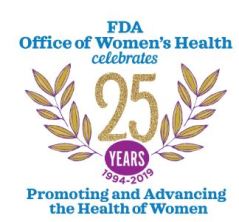News & Views: AEDs, Office on New Drugs reorganization, New digital health policies, Office of Women’s Health, THC vapes warning

Check Your AED: Is it FDA Approved?
Automated external defibrillators (AEDs) are portable, life-saving devices designed to treat sudden cardiac arrest,
- Public access AEDs used by laypeople who have received minimal training
- Professional use AEDs used by first responders who receive additional AED training
Premarket approval (PMA) now required new and existing AEDs and necessary AED accessories batteries, pad electrodes, adapters and hardware keys for pediatric use)- deadline Feb 3, 2020
- To ensure the quality and reliability
- Needs sufficient valid scientific evidence to reasonably assure the device is safe and effective
- Requires manufacturers to receive FDA approval before initiating design, manufacturing, or labeling changes to the device, imposes certain other annual reporting requirements.

Reorganization of the Office of New Drugs with Corresponding Changes to the Office of Translational Sciences and the Office of Pharmaceutical Quality
To modernize the New Drugs Regulatory Program – a reorganization of the New Drugs Regulatory Program
Restructuring of the Office of New Drugs (OND) and corresponding changes in the Office of Translational Sciences (OTS) and Office of Pharmaceutical Quality (OPQ)
- Create offices that align interrelated disease areas, and divisions with clearer and more focused areas of expertise
- Enable greater efficiency, better understand the diseases, enhance scientific leadership

New steps to advance digital health policies that encourage innovation and enable efficient and modern regulatory oversight
Guidances to continue to encourage innovative approaches to the development of digital health tools and advanced FDA oversight
Clinical Decision Support Software, (revision)
- Patients, families and health care professionals increasingly embracing digital health technologies to inform everyday decisions
- Encourage developers to create, adapt and expand functionalities of software to support providers in diagnosing and treating diseases, while ensuring no unacceptable risk to patient
- Focus our regulatory oversight on CDS functions intended to help health care professionals and patients inform their clinical management for serious or critical conditions- no independent evaluation of the basis of software’s recommendations
- Types of software that are no longer considered medical devices under the amended definition of device
- Mobile apps that are intended only for maintaining or encouraging a healthy lifestyle – generally fall outside the scope FDA’s regulation

Critical Focus on Women’s Health
Office of Women’s Health established in 1994 to advance health of women through science, policy, education, outreach, and inclusion of women in clinical trials
- Investing in Women’s Health Through Engagement and Education
- Fostering Scientific Research and Filling Knowledge Gaps
- Advancing Medical Therapies that Meet Women’s Needs

FDA Warns Public to Stop Using Tetrahydrocannabinol (THC)-Containing Vaping Products and Any Vaping Products Obtained Off the Street
FDA strengthening warning to consumers to STOP using vaping products containing THC
- More than 1,000 reports of lung injuries- including some resulting in deaths-following the use of vaping products
- Most of the patients reported using THC-containing products, suggesting THC vaping products play a role in the outbreak
FDA Actions
- Working closely with federal and state partners to identify the products or substances that may be causing the illnesses
- FDA’s Forensic Chemistry Center using state-of-the-art technology to analyze hundreds of samples for the presence of a broad range of chemicals
Image credit: FDA